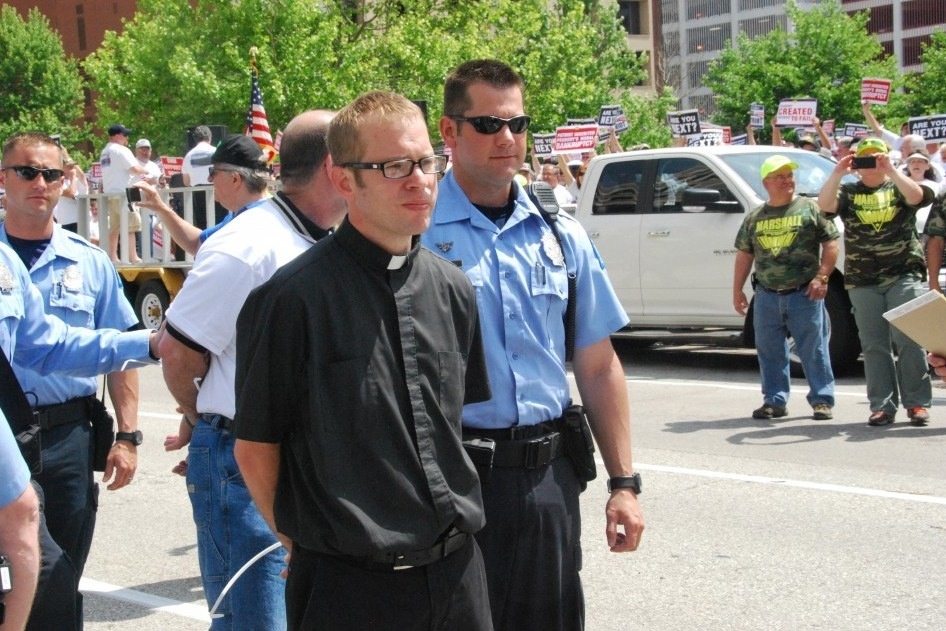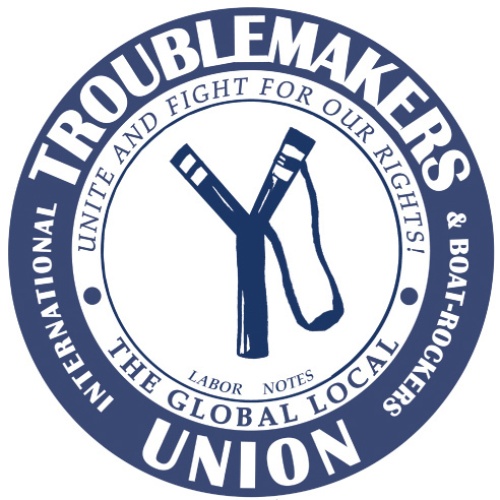'Labor priests' reviving social justice teachings -- and action

By Robert Richter, Labor Notes
"Labor priests" were a recognized presence in the labor movement of the 1920s through the 1960s. Father Barry, the Karl Malden character in the 1954 film "On the Waterfront," was the model of the priest who sided with workers.
Priests conducted Parish Labor Schools where workers interested in collective bargaining studied Catholic social justice doctrine, labor law, and parliamentary procedure.
While parish-based Labor Schools have been largely replaced today by worker centers, labor priests are once again gaining numbers (100 at last count) who share their vision that to diminish workers is to rob them of their God-given vocation.
The Priest-Labor Initiative was founded in 2012 by Father Clete Kiley and held its third meeting last month in Atlanta, with two dozen priests in attendance. Kiley was pastor of a large immigrant parish in Chicago, worked on organizing drives at university food services and at O'Hare airport, and is now director for immigration policy for UNITE HERE, the hotel workers union.
The third meeting of the Priest-Labor Initiative showed some noticeable differences.
A group that began with young, coast-centric, and primarily immigrant backgrounds saw middle-aged priests join from the South as well as a few Midwest states.
The Association of U.S. Catholic Priests, which recently formed a labor caucus, also sent several priests and plans to partner with the initiative.
Father Clete Kiley said, "We've got 30,000 priests in the country, and we've got a hundred [in our network]. So we got higher goals than that."
The past year has seen the influence of Pope Francis.
"Every time he speaks to priests, he's saying things like we need to have 'the smell of the sheep' on us, we need to get out of our churches, we need to go out and engage people, we need to encounter people," Kiley said.
"It seems to have given, I don't want to say permission, but an added emphasis for this kind of an initiative."
That's led to priests more confident in engaging issues of labor and work.
On Capitol Hill, Tom Shellabarger, a public policy advocate with Interfaith Worker Justice, has seen the church's profile raised in a new light -- everyone's asking about Francis.
"They want to know: Is the church really going to respond the way Francis has responded?" Shellabarger said. "Is the church going to be there out in the streets the way Francis has called them to be?"
Excerpted from National Catholic Reporter, by Brian Roewe.
Pope's Overhead Cover
Labor priests are doing at the parish level what Pope Francis is doing at his level. Immigration reform, income inequality, human trafficking, a living wage are some of the justice and peace issues on labor priests' agenda, with overhead cover from Francis.
The present-day labor priest is focused on the community as a core value, insisting that all members of the community receive an adequate share in the fruits of their labor. As he deals with those who labor and are heavily burdened by underemployment, no employment, low wages, no health care, wage theft, assault and abuse in the workplace, he can be a source of compassion, mercy, and counsel. To all he says, "Come, let us reason together how to make the workplace more humane."
Especially objectionable are imaginative, creative but harmful tactics that cheat the worker of a livelihood, health care, earned vacation time, and sick leave, and plunder pensions. At another level, the practice of pumping infusions of cash to legislators through lobbyists to fix the scales of justice for cheating, or shifting public services like hospitals, postal, prisons, and schools to for-profit contracts is even more troubling.
Labor priests believe there is a role for visible clergy supporting the religious, moral, and spiritual dimension of work, to advocate for oppressed workers, and to walk with them -- especially to witness when they return to work after an action. Clergy played this role after the fast-food strikes, escorting workers back to the workplace to fend off retaliation.
So priests continue to gather for the two-day Priest-Labor Initiative training events to develop a network and to invite priests to become closer with working-class men and women.
Actions the reader might take to help grow labor priests:
• Ask your priest to conduct a listening session for workers to tell their stories and discuss what to do about things they want to change, using parish facilities like parking, meeting rooms, and kitchen.
• Ask the priest to observe an organized worker action and be present, especially after, to witness events when workers go back in to work.
The bottom line for labor priests: This is not a special ministry. This is what we do as Catholic leaders.
Robert Richter is a parish priest in Arlington, Virginia.
Tags
Labor Notes
Labor Notes is a media and organizing project that has been the voice of union activists since 1979.
